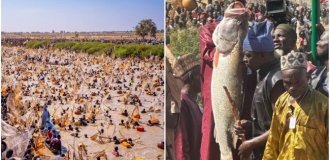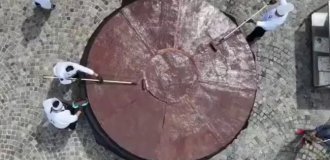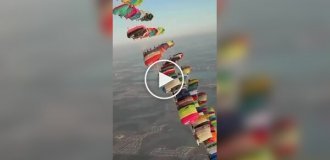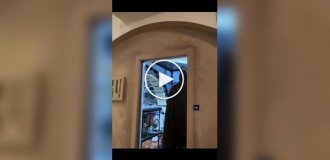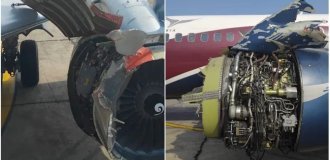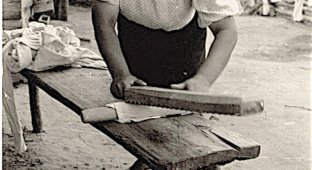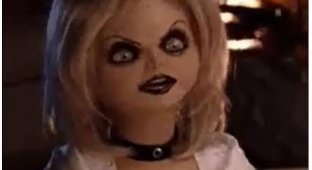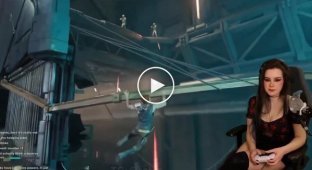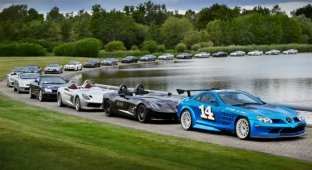The tragedy of Cap Arcona: war crimes of the last days of the world war (5 photos)
Wars are associated not only with honor, valor and the achievements of people who become heroes, and their names remain for centuries. Wars are also dirt, cold and death of those who are nearby, and, most importantly, extreme bitterness of the parties to the conflict. This especially begins to manifest itself when one side clearly understands that it will no longer be able to win, and will have to answer for all its crimes. 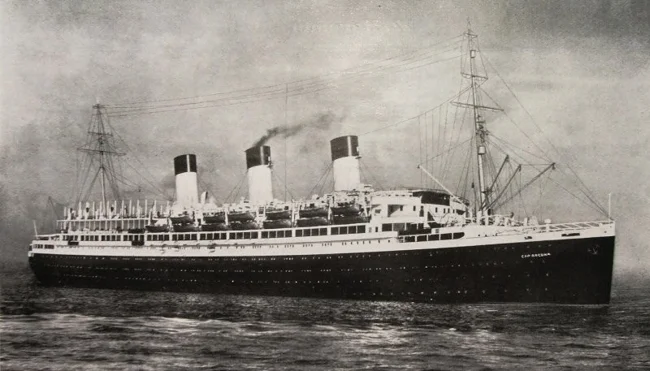
SS Cap Arcona, photo of 1927
Perhaps these were the thoughts that guided the remnants of Germany in 1945 - squeezed from two sides, they understood what awaited them for their crimes and tried in every possible way to hide what they had done.
In the 30s of the interbellum of the 20th century, Germany, which had already turned into the Third Reich, demonstrated its "new and progressive" ideas and scientific and technical achievements to the whole world. One of the vectors of such propaganda was sea transportation, in particular cruise liners. The liner "Cap Arcona" (SS Cap Arcona) was designed and built as an example of superiority over the rest. Fashionable interior decoration and at the same time lower ticket prices compared to English and French cruise ships - this made it incredibly popular.
However, at the beginning of the war, the world had no time for cruises. "Cap Arcona" was requisitioned, and until the end of the war served either as a troop transport or a floating barracks. The ship met 1945 in the port of Lübeck, standing in the roadstead together with transports and ships Deutschland, Thielbek and Athen. In March-April of the same year, the ships were in a deplorable technical condition. It was decided to use them as floating prisons. Prisoners of concentration camps from the lands liberated by Soviet troops and allies were brought here. And by the beginning of May 1945, there were, according to various estimates, from 4 to 5.5 thousand prisoners on board the Cap Arcona. All life-saving equipment on the ships was out of order, and the only help that was provided to the prisoners was provided by the International Red Cross. This organization agreed with the Germans on the release of several hundred prisoners, but was unable to do more. On May 2, all the ships with prisoners were towed to the Lübeck roadstead. According to the testimony of Nazi criminals at post-war trials, it turned out that the units that played the role of guards received orders to liquidate the prisoners in order to hide the crimes committed by the Nazis in concentration camps.
On the same day, British troops entered the city. A representative of the Red Cross ensured that the British were informed about the prisoners on the ships, but in the chaos that reigned after the partial capture of Lübeck, this report was either not delivered to the leadership in time or was simply lost. But the British command received reports from their intelligence. They said that some of the officers and the leadership of the concentration camps were planning to evacuate to Norway. To prevent this, an air attack on the port was authorized.
On May 3, 1945, British Hawker Typhoon fighter-bombers appeared in the sky over the bay of Lübeck. Having discovered the ships at anchor, they began the attack. Armed with 20-millimeter cannons, 230-kilogram bombs and 27-kilogram unguided rockets, they attacked the stationary ships. The Thielbek went to the bottom first. According to subsequent estimates, there were about 2,800 people on board, of whom only more than a hundred were saved. The Deutschland and the Cap Arcona were more resistant to attacks and remained afloat, but a strong fire started on them. Athen escaped attack because it was moored awaiting another batch of concentration camp prisoners, and at the moment of the attack, British infantry had just arrived at its mooring point, and the guards chose to abandon their post instead of giving battle. 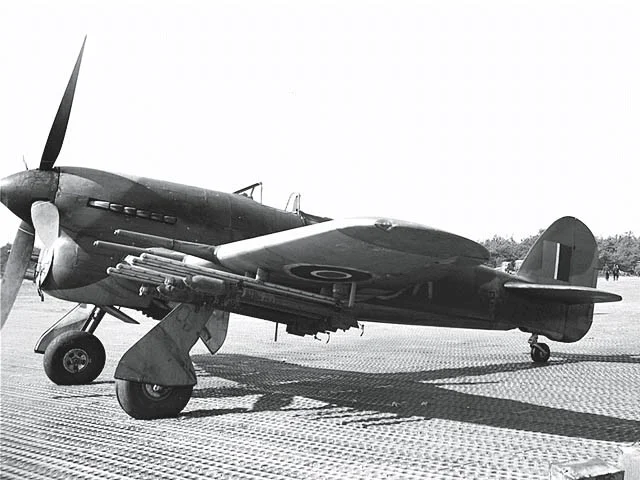
British Hawker Typhoon fighter-bomber equipped with RP-3 unguided rockets
Meanwhile, a real tragedy unfolded on the Cap Arcona. The guards did not allow the prisoners to leave the ship or to try to survive in any way. An hour after the attack began, at 15.45, the Cap Arcona capsized and sank. Most of the guards, who had life jackets and boats, managed to leave. The surviving prisoners tried to save themselves by swimming, but everyone opened fire on them. Guard units machine-gunned them from the shore. And British planes continued to attack from the air. Here are the words from the post-war memoirs of one of the British pilots:
"We shot them in the water with 20-millimeter cannons. It was a nightmare, but we were given the order, and we carried it out. That's war!"
Allan Wise, pilot of the 193rd Squadron of the Royal Air Force
As a result of the ensuing carnage, only 314 prisoners and a few crew members managed to escape from the Cap Arcona. The Deutschland, which was moored nearby, burned for a couple of hours before sinking. According to the captain, there was no one on board, but according to the Red Cross, there could have been up to 2,000 people on board.
The air raid ended only by 17:00, and it took the British another hour to figure out who was the target of their attack, and only then was the order given to begin the rescue operation. Some post-war memoirs say that the British officer who accepted the capitulation of the port from one of the Germans was so impressed by what he saw that in response to a military salute he snatched the officer's cane from him and hit him on the head.
In total, between 7,000 and 9,000 people died as a result of the tragedy. Most were concentration camp prisoners. For weeks after the massacre, bodies of the dead washed up on the shore, and were subsequently found on the shore for decades. The last officially documented case of a body being found, identified as one of the victims of this tragedy, was in 1971. 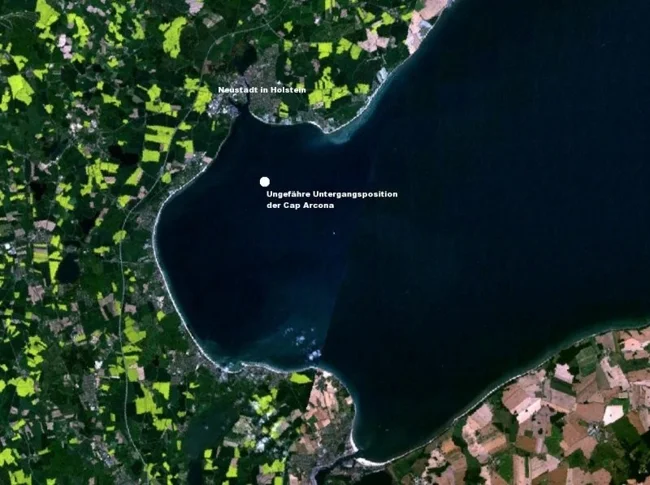
The site of the sinking of the "Cap Arcona" in the Bay of Lübeck
Post-war researchers disagree on what caused such a terrible tragedy in the last days of the war. Some point to Churchill's order from early 1945 to speed up the Allied advance along the coast and take Lübeck as quickly as possible to prevent the Red Army from entering Denmark as a major factor in the incident. Due to heavy transport traffic and orders from the German High Command to their ships for a last ditch effort to sink everything they could, the RAF did not rely too much on intelligence or reports from other services such as the Red Cross.
They simply attacked any ships they considered hostile. What happened in Lübeck in those days clearly fell under the definition of a "war crime". However, after World War II, the Allies were mainly busy investigating the crimes of the Nazi regime of the Third Reich, and this incident was not particularly investigated. In fact, no one involved in this tragedy was ever punished. The surviving German officers were tried mainly as witnesses or defendants in other cases. No one was held responsible on the British side. 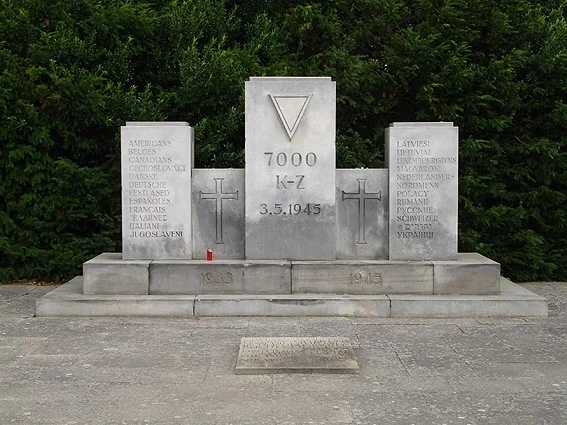
A monument to the victims of Cap Arcona and Thielbek in Neustadt
On May 7, 1945, the British organized a small memorial ceremony. There were 15 soldiers and several dozen survivors from the Cap Arcona. The memory of the tragedy now exists in the form of three mass graves on the coast between Neustadt and Pelzerhaken. Later, monuments were erected at these graves, and in 1990, the Cap Arcona Museum was opened to mark the forty-fifth anniversary of the tragedy.
It is worth noting that the "Lübeck Massacre" was one of the most terrible and widespread maritime disasters. In terms of the number of victims, it is in fourth place among all maritime disasters in the world. The cause of the incident was an error or negligence of British intelligence, and several thousand people who survived the horrors of concentration camps died, not living to see the end of the war just a few days.
